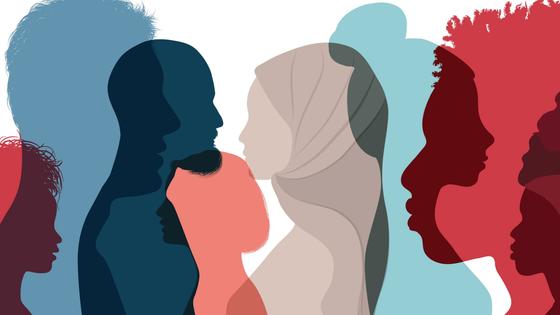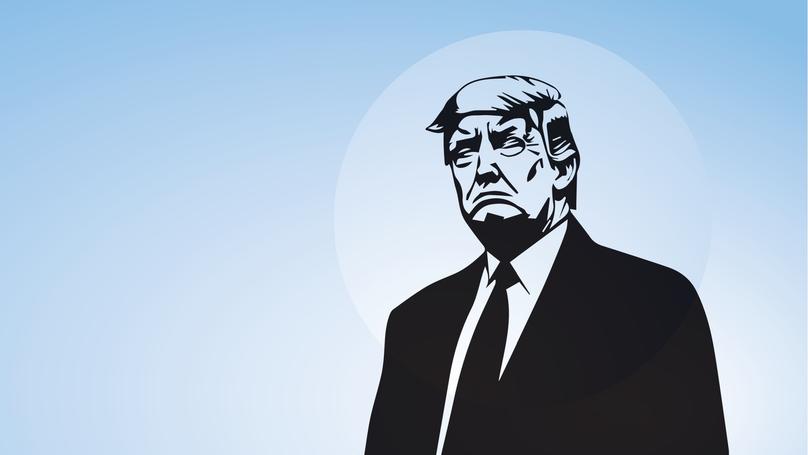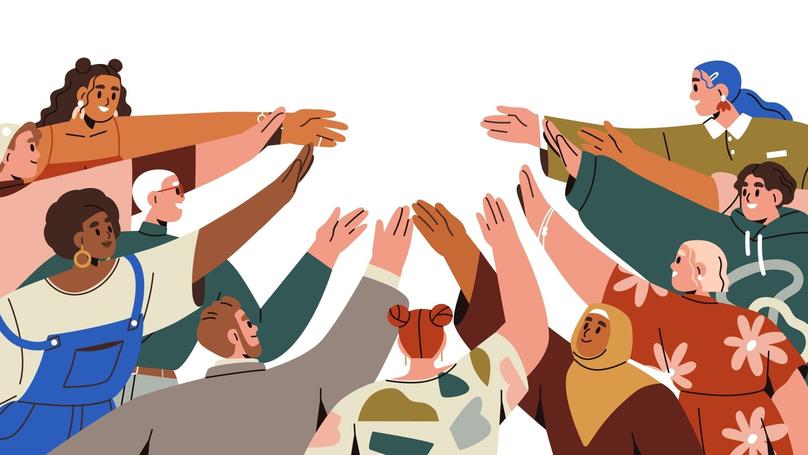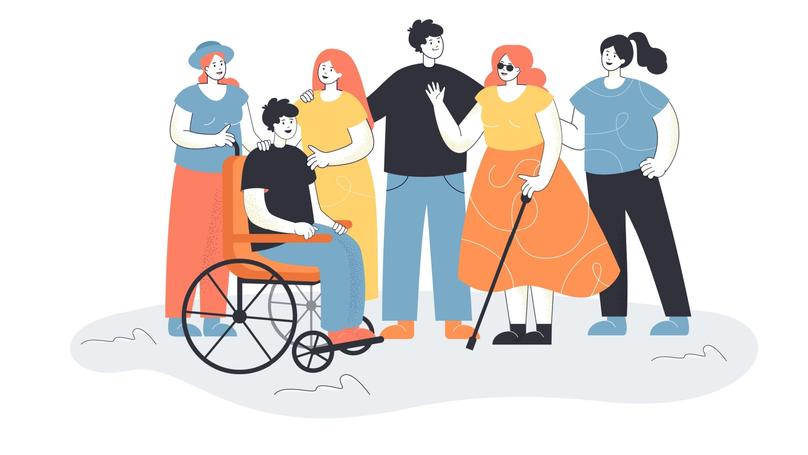Inclusivity and Equality VS Return to “Traditional” Values
Until recently, it was the United States that actively promoted and popularized the ideology of diversity, equality, and inclusivity throughout the world.

However, now the new government is just as zealously abandoning previously adopted programs and laws, canceling quotas intended for the education and employment of representatives of small national groups, sexual minorities, and specialists with disabilities.
Even during the election campaign, Donald Trump criticized the DEI policy, that is, diversity, equity and inclusion, and upon taking office as president, canceled a number of decrees promoting equality in education, corporate culture, and public service. The new president's administration is also convinced that diversity trends contribute to the discrimination of white heterosexual men. This was confirmed by Elon Musk, who headed the department for improving the efficiency of the government: "We intend to end this policy forever." Let's try to figure out what is specific about the DEI trend, what are its advantages and what will the abolition of the ideology of diversity lead to.
"Revenge": Trump vs. Tolerant America

The trend towards Diversity and Inclusion began to spread in America in the middle of the last century as one of the ways to combat inequality. Already in 1964, the "Civil Rights Act" was issued, officially prohibiting discrimination in the workplace. However, even before the adoption of the official document and the emergence of the very concept of DEI, IBM actively used the principles of diversity, equality and inclusivity, hiring specialists from different ethnic and racial groups, evaluating exclusively their experience and personal characteristics. However, now the situation in the homeland of DEI is developing differently and it seems that troubled times have come for the further promotion of the principles of diversity and equality.
Immediately after the inauguration on January 20, 2025, the new owner of the White House signed numerous decrees to abolish all programs of inclusivity and diversity in government departments. Already dozens of employees of the American Department of Education, who underwent courses on inclusivity in the workplace, resigned "of their own free will" or were made redundant. American officers representing sexual minorities are also at risk. According to Trump, many of them, as a rule, are more interested in achieving diversity than in planning military operations and ensuring the country's security. The President also banned transgender people from serving in the army, and officials from emphasizing their gender identity, for example, stating their preferred pronouns.
A separate decree "Removing Men from Women's Sports" presupposes, in turn, a ban on transgender women participating in competitions with other female athletes. But that's not all - one of the new laws "Protecting Women from Gender Ideological Extremism and Restoring Biological Truth" implies the recognition in the United States of only two sexes - male and female. In addition, an additional decree prohibits federal agencies from funding or in any other way promoting the idea of gender transition at any age.
Big Tech Follows Suit in Abandoning Inclusion
Adhering to the course of the ruling party, the largest American corporations also abandoned the internal DEI policy. For example, the McDonald's network has already canceled previously established "diversity indicators" and stated that it will no longer require suppliers to provide information on achieving corporate equality. Nevertheless, McDonald's is one of the last such large networks to abandon the DEI policy. Earlier, Walmart, Tractor Supply, Ford Motors and innovative giants like Meta massively abandoned inclusivity programs.
The technology conglomerate has closed its programs to achieve equality and ensure diversity in the employment of new employees, their training and advanced training, the selection of partners and suppliers. Meta also abandoned the Diverse Slate Approach when hiring new specialists. First of all, it ensured the formation of a list of applicants, which must include representatives of different demographic groups, ethnic and racial minorities. The company explained that such a policy involves making decisions based on gender or race. Nevertheless, Meta has previously made progress and increased the number of black and Latin Americans among its employees. Meta also relaxed the rules, or rather completely removed the restrictions, regarding offensive comments and statements against people with certain physical and mental disorders, a certain sexual orientation, nationality, religion on the company's platforms. That is, the company's filters will automatically track only illegal information or particularly serious violations, and in other cases Meta relies on user complaints. In other words, Meta platforms are now not responsible for what is published on them. Mark Zuckerberg himself called this "restoring freedom of expression" and "returning to the origins."
A few months ago, it became known that Amazon is phasing out "outdated" programs related to the development of inclusivity. This is happening in corporations such as Google, Microsoft and many other less large-scale companies. Zoom Video Communications Inc. laid off an entire team of employees ensuring compliance with DEI principles. One of the few corporations that opposed the abolition of diversity programs is Apple. The company criticized the proposal to abandon the principles of inclusivity. The Apple Council stated that it will continue to foster "a culture in which every employee can reach their potential and work as well as possible."
It is no coincidence that inclusivity and diversity are called the key to the rapid and successful development of business. Trends towards abandoning DEI can negatively affect both the labor market and innovation in general. Let's figure out what the trend towards diversity is and why it is needed in the modern world.
What is diversity and why is it important

Over the past decade, DEI has become not just a trend, but a prerequisite for the development of society and its individual spheres, including education, business and corporate culture, creative industries, and so on.
Diversity, Equity and Inclusion implies certain principles and trends in communication, management and other processes, according to which all people, regardless of their health, age and gender, sexual preferences, nationality and religion, are equally valuable and important. In a corporate environment, DEI means that the professional qualities and competencies of a specialist are of paramount importance, and not certain personal characteristics. This is necessary for the development and creative realization of representatives of the most different social strata, achieving equality and improving the quality of life. At the same time, inclusivity also includes the creation of appropriate working conditions, the formation of a favorable and tolerant corporate culture, so that every employee has the opportunity to comfortably and effectively perform their duties.
The ideology of diversity and inclusion is based on the belief that a team consisting of representatives of different social groups (because diversity implies many aspects, in addition to the above, this can be place of residence, education, income level, professional background) is able to generate the most creative and non-standard ideas, offer more options for achieving the goal, quickly resolve emerging problems, explore and improve business processes simultaneously from several points of view. Experts from the international consulting company McKinsey&Company found that DEI principles really have a positive impact on the financial performance of production, thanks to the combination of different employees with different experiences and skills.
Nevertheless, it is important to understand that it is the ability to competently use this diversity and involve all employees in the tasks, taking into account their individuality, interests and needs, that primarily increases business efficiency.
What else does inclusivity imply
Being in trend and complying with DEI is not so difficult. In order to contribute to achieving equality, it is enough to adhere to the key values of diversity and inclusivity. This is:
-
Rejection of gender stereotypes, since women still face prejudices when choosing certain professions, for example, in IT;
-
Eliminating age barriers, it is important to avoid prejudices and not refuse a vacancy to specialists only because of their age;
-
Integration of people with health characteristics into business processes, for example, organizing inclusive hiring;
-
Acceptance of different experiences and the past of employees, that is, the need to involve people who have gone through difficult life circumstances in activities, for example, serving a sentence in prison.
In fact, it is not entirely correct to define diversity solely through gender, age, nationality and religion. Business results are not so much influenced by such criteria as the cognitive abundance of employees. For example, Harvard Business Review conducted an experiment involving students, senior executives, general managers, and teenagers. All of them, of different ages and nationalities, were divided into several teams to solve certain problems. As it turned out, neither gender, nor cultural affiliation, nor other similar factors significantly affected the results. However, HBR found that it was the diversity of people's thinking that affected the success of the teams. This criterion does not depend on gender or ethnicity, so it turned out to be more difficult to detect.
Thus, teams consisting of people with different education and professional experience, place of residence, and cultural background work most efficiently and effectively. This is the key goal of DEI today - to ensure not only gender, racial, age and religious, but also cognitive diversity.
What are the advantages of DEI policy

The key advantages of DEI in a corporate environment, in addition to the fact that it promotes equality, are as follows:
-
the more diverse the work (and not only) team, the higher the creative potential of the entire team;
-
the more people have the opportunity to express their views on the current situation or the problem that has arisen, the lower the risk of making a mistake and the higher the quality of the chosen business solution, since it will not be of a subjective nature, it will be more verified, balanced and analyzed from different angles;
-
the more diverse the experience, interests, standard of living and background of employees, the wider the outlook of the entire company (in other words, eyes are opened to the previously unnoticed needs of part of the target audience);
-
the more inclusive the working environment, the more competent and highly qualified employees will attract the business (according to the popular job search and job comparison service Glassdoor, 76% of respondents clarified that a diverse team is the most important factor when evaluating companies).
Lectera’s Online Courses by topic
How to promote DEI in the workforce
First of all, determine what diversity, equality and inclusivity mean to you personally. Approaches to such a policy can vary significantly in different organizations. Therefore, it is best to start with a description of the ideal work team - what specialists make it up, what values and views they share.
Next, find out what employees and skills, talents, and knowledge the company lacks. It will be necessary to analyze all ongoing business processes and their results, as well as the competencies of each individual specialist. A kind of audit of skills will allow you to find new growth points for employees, inspire them and create an inclusive, comfortable environment for everyone. In addition, this will help to predict possible problems and prevent them due to cognitive diversity in the team.
In addition, in order to develop an inclusive environment in the company, be sure to indicate in open vacancies who can be applicants - people with mental or physical health characteristics, representatives of small ethnic people, specialists 50+, and so on. It is not enough just to mention that the company follows DEI, always specify exactly what it means, for example, inclusive leadership, when people with disabilities can occupy leadership positions in the organization.
Do not forget that all employees, regardless of their characteristics, should be treated fairly, impartially assessing the results of everyone's work and offering everyone equal opportunities.
It is also important to maintain a healthy psychological climate in the team during the work process, introduce well-being programs and various other team-building techniques. No less important point in the process of team building is the encouragement of cooperation, and not competition. In an inclusive working environment, all employees not only work side by side with each other, but also listen to the opinions of colleagues, respect different points of view, share their experience and provide support. Such cooperation leads to an increase in the efficiency of each individual employee and the team as a whole.
Special attention should be paid to innovations - be prepared for innovations and the volatility of the modern market, do not be afraid of experiments and broadcast your values!
DEI culture is always directly related to countering stereotypes and prejudices, dispelling myths and creating a comfortable, favorable environment in which each person can express themselves, realize certain ideas, achieve professional success, despite physiological characteristics, past experience, personal views and worldview. Today, we have all the tools, primarily innovative ones, to make society and almost all of its spheres inclusive, achieve equality and develop cognitive diversity in teams - from school classes, student groups and interest clubs to professional teams in startups and the largest corporations.
Share this with your friends via:
Latest News

A significant stage in the development of the alternative education system has begun in West Northamptonshire in the UK: the County Council is actively calling on parents, guardians, and trustees to participate in shaping the future of this key area.

Outwoods Primary School in Atherstone, Warwickshire, having experienced deep sadness after the loss of their famous cat, Silla, has found solace in a new pet – a Maine Coon named Aloysius O’Hara.

In modern universities, artificial intelligence, and in particular ChatGPT, is rapidly transforming from a controversial tool into a full-fledged student assistant.

An innovative educational project is gaining momentum in UK primary schools, aiming to change attitudes towards video games.

The Massachusetts Institute of Technology (MIT) presents MIT Learn – a revolutionary online platform that opens a “new front door” to access university knowledge and resources.












 Test: What Business is Right For You?
Test: What Business is Right For You?
 “I’m Here for the Long Haul”: When Loyalty to a Company Becomes Toxic
“I’m Here for the Long Haul”: When Loyalty to a Company Becomes Toxic
 Freelancing, Remote Work, Office Jobs, or Consulting: How to Choose the Work Format That’s Right for You
Freelancing, Remote Work, Office Jobs, or Consulting: How to Choose the Work Format That’s Right for You
 Test: How Prone Are You to Abusive Behavior as a Manager?
Test: How Prone Are You to Abusive Behavior as a Manager?
 Test. What superpower would you possess if you were a superhero?
Test. What superpower would you possess if you were a superhero?
 Test. What Should You Let Go of Before Winter Ends?
Test. What Should You Let Go of Before Winter Ends?
